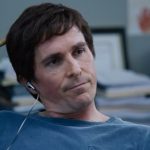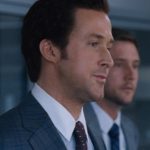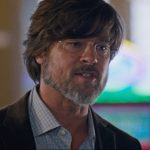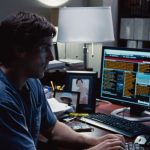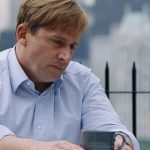The Big Short – 2015
I’m honestly on the fence about this one. I’m having trouble deciding if I liked this movie or not. It is based on a true story, and though Hollywood has a habit of distorting reality to create drama, The Big Short apparently did not. Director Adam McKay was pretty innovative in the way in which he told his story. There was a lot of fourth wall breaking by multiple characters, telling the audience things like, “This actually happened,” or , “We’re not making this up.” And on the flip side, there was even a moment when they said, “This isn’t actually the way it happened. It really happened like this.”
There were also a number of times in the film, when they are discussing subjects that most average people wouldn’t understand, they took aside moments to have celebrities, playing themselves, explaining things in simplistic ways, using metaphors so the everyday layperson could comprehend the complex subject of the United States housing market in the late 2000s. They did their best to truthfully explain the confusing subject of the film: the financial crisis of 2007 – 2008, which was caused by the U.S. Housing Bubble. They also touched a little bit on how this was ultimately a major contributing factor in the global financial crisis that followed.
The movie has an innate tension already built into the plot, because we already know what happened. So, it wasn’t a question of “if.” It was a question of “how,” and what did the few people who saw it coming do? The film follows three different groups who figured out what was really happening and did what they could to cash in on the tragedy. They didn’t do what they could to stop it or warn people, but they made millions of dollars from the terrible events that made millions of people jobless and homeless. To the film’s credit, this moral dilemma was not ignored.
In the first group, we have Christian Bale playing Michael Burry. He is the eccentric operator of Scion Capital, the first man to discover the Housing Bubble. Without asking the permission of his investors, he buys over $1.3 billion in credit default swaps, predicting the economic crisis. Everyone thinks he is crazy and he restricts withdrawing when his investors demand their money back. Even when they start to sue him, he refuses to reverse his position, knowing he is right. Even after watching the movie, I still don’t pretend to understand the intricacies of what the Housing Bubble actually was or what caused it. Sufficed to say, buying default swaps from the banks meant that he would eventually have returns of $2.69 billion.
The second group is made up of Deutsche Bank salesman, Jared Vennett, played by Ryan Gosling, Mark Baum, played by Steve Carell, the head of Front Point Partners, and his staff, Porter, Danny, and Vinny, played by Hamish Linklater, Rafe Spall, and Jeremy Strong. Vennett looks at Burry’s analysis of the housing market, and seeks out buyers. He finds Baum and his team, and they do some field investigating. They determine that it is all true and begin buying as much as they can. Also, along with this story line, Marissa Tomei plays Cynthia, Mark’s wife.
The third group has John Magaro and Finn Whittrock playing Charlie Geller and Jamie Shipley, co-owners of the Brownfield Fund, a small-time business they two men started from scratch. The stumble across a prospectus written by Vennett, and seek the aid of Ben Rickert, played by Brad Pitt, a reclusive germaphobe who hates the financial world, but agrees to enter it again as a favor to Charlie and Jamie. The three of them nearly bankrupt themselves buying credit default swaps.
Like I said, the actual details of the Housing Market crisis were very confusing, but it was ok because when something critical to the viewers understanding of the subject needed to be explained, a celebrity would be introduced to spell it out. For example, when we needed to know about Mortgage-backed securities and Subprime loans, a naked Margot Robbie in a bubble bath, sipping on a glass of champagne, appeared on the screen to tell us about them. When collateralized debt obligations (or CODs) became important, world famous chef Anthony Bourdain appeared to fill us in. And when the subject of synthetic CODs became the topic, Richard Thaler and Selina Gomez gave us the low-down.
In the end, they took a confusing subject and were able to explain it in an innovative and entertaining way. If anyone really stood out to me, it would be Steve Carell. He was the one who figured out what the collapse of the housing market would really mean on a global scale, and what it would mean to the millions of unsuspecting families across the nation. He actually felt guilty about profiting from their loss. Carell played it well. To the movie’s credit, critics say that the film was uncannily accurate. At the end, the depressing figures were displayed on the screen. “When the dust settled from the collapse, $5 trillion in pension money, real estate value, and 401k savings had disappeared. 8 million people had lost their jobs, 6 million lost their homes. And that was just in the USA.” A depressing thought, but it is now history, and this movie did what it could to pay tribute.
